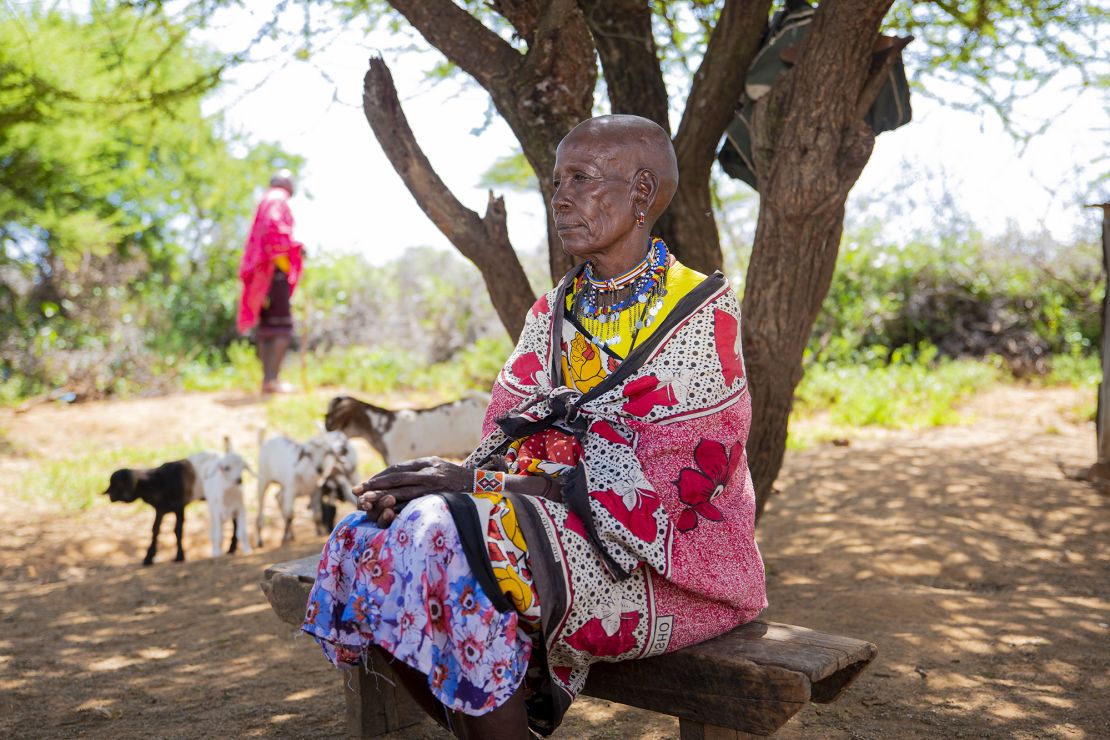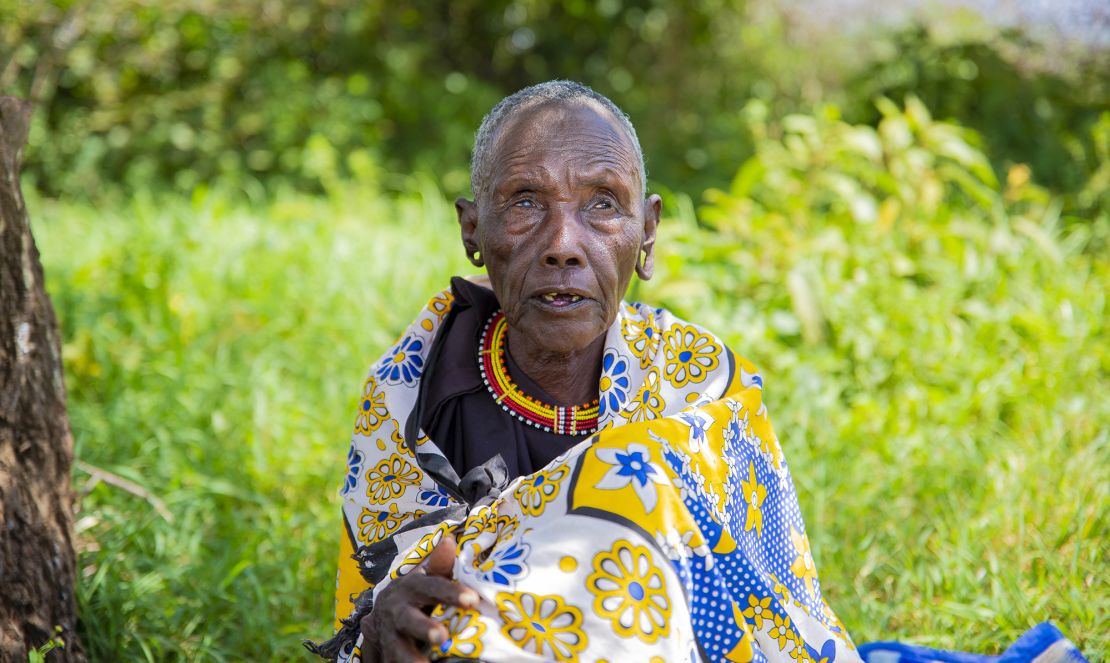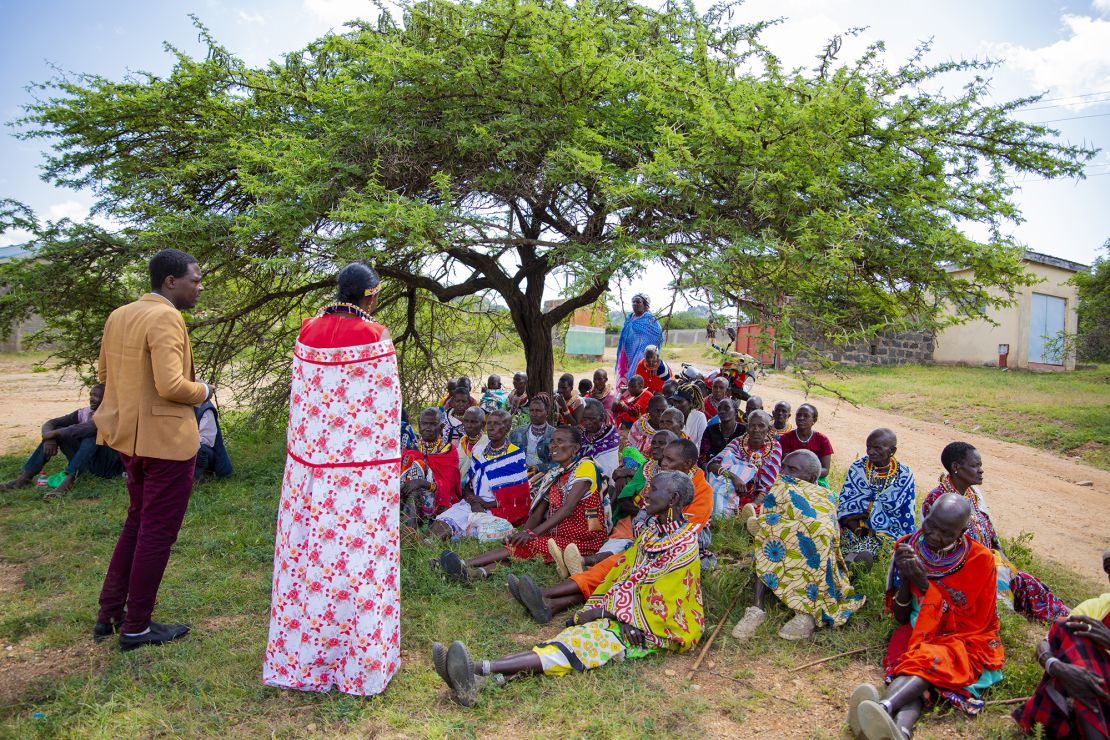Marian Pannalossy, 17, stands out wherever she goes in Archer’s Post, a little town 200 kilometres north of Nairobi. She lives alone and is light-skinned in a community where mixed-race persons are rare and thus marginalised.
“They call me ‘mzungu maskini,’ or a poor white girl,” she told CNN at her single-room house, a tremor in her voice. “They always say ‘Why are you here? Just look for connections so that you can go to your own people. You don’t belong here. You’re not supposed to be here suffering.’”
Marian believes that her father was a British soldier, but she has never met him. She does not even know his name.
Marian is among a group of mixed-race children whose mothers say they were conceived after rape by British soldiers training in Kenya. Her mother, Lydia Juma, was among hundreds of Kenyan women who filed complaints with the UK military over the years, as documented by Kenya’s human rights body.
“I don’t know why God is punishing me. I don’t understand,” Juma said through tears in a powerful 2011 documentary, ‘The Rape of the Samburu Women.’
Marian, aged four at the time, sat on her lap, sometimes hugging her mother as she wept and recounted how she was violated and the suffering she had endured since.
Juma’s live-in boyfriend, with whom she had two older children, left her after she gave birth to Marian, a mixed-race child, because rape is a taboo in their culture. “The moment he saw that the child is ‘white,’ he went, and he went forever,” she said in the film.
Juma died two years after that interview without ever finding the man she says raped her.
Mixed-race children continue to be born in the remote villages where the British Army trains its soldiers in Kenya. The British Army Training Unit, Kenya (BATUK), is headquartered in the town of Nanyuki, about 70 miles southwest of Archer’s Post.
BATUK is currently under investigation by the Defense, Intelligence and Foreign Relations committee of Kenya’s National Assembly.
It has held public hearings in several areas where British troops train and heard a litany of complaints about abuse, exploitation, and sexual assaults from communities around them.
It intends to hear from BATUK officials and the British High Commissioner to Kenya at the end of its work later this month, according to a schedule shared with CNN.
One of the more contentious accusations against British soldiers involves the case of Agnes Wanjiru.
Wanjiru, a 21-year-old Kenyan woman, vanished in 2012 after entering a hotel with British soldiers, according to reports.
Her body was later found in a septic tank. Despite a Kenyan inquest ruling her death a murder and the reported identification of a suspect by fellow soldiers, the British soldier allegedly involved hasn’t faced charges.
Wanjiru’s family believes British officials are indifferent to her case and pleaded with the King for help during his visit to Kenya.
A British High Commission spokesperson said it takes all allegations raised by the community seriously and it will ensure thorough investigations.
“All sexual activity which involves the abuse of power, including buying sex whether in the UK or abroad, is prohibited,” the British High Commission, speaking on behalf of BATUK, said in a statement to CNN.
“We are committed to preventing sexual exploitation in any form and investigate and hold to account any Service Personnel found to be involved in it.”
‘British boys behaving badly’
Britain pays Kenya about $400,000 a year to allow its soldiers to train in the East African country, mostly in the expansive wildlife conservancies in Laikipia and Samburu counties.
Kenya renewed the defense pact in 2021 despite strong local opposition. BATUK has a permanent training base in Nanyuki, to the south of those wildlife conservancies, with 100 full-time staff.
The Defense, Intelligence and Foreign Relations committee’s work has renewed scrutiny of the British Army’s operations in Kenya and once again brought attention to the cases of the women who have accused soldiers of rape over several decades.
Allegations of rape and other crimes, including murder, by British soldiers deployed there date back to the 1950s.
“This to us is an example of British boys behaving badly,” said Marian Mutugi, a commissioner for the Kenya National Commission on Human Rights.
“This is a matter of taking care of the vulnerable in our society who our constitution says require special protection.”
She’s referring to hundreds of women from the mostly pastoralist Maasai and Samburu communities who accused the British Army of rapes in the 1970s and 80s.
They were represented by the British lawyer Martyn Day in a landmark civil case in London in the early 2000s.
Ntoyie Lenkanan, 72, was among the complainants in the British case.
Nearly forty years later, her voice trembles with emotion and barely controlled anger as she recounts her ordeal.

“I was going to fetch water when I was ambushed by a group of British soldiers who were hiding in the grass near the river. One of them grabbed me and raped me,” she told CNN at her home in DolDol, about 35 miles north of Nanyuki.
She has been waiting years for an official acknowledgment of the violation and compensation, but neither has come.
A few miles from Lenkanan’s home in the sparsely populated arid lands of DolDol, Saitet Noltwalal who is in her 70s, sits under a tree. She is blind and frail, relying on her family for everything.

She, too, says she was raped by a British soldier at a hill near her home a few decades ago but she no longer remembers the exact period.
“I have been waiting a long time and I can no longer fend for myself. I wouldn’t like what happened to me to happen to anyone else,” she said.
Her quality of life nosedived after the rape as she miscarried the child and lost her eyesight shortly after, she said. Some of her peers who accused the British Army of sexual violations have died while waiting for redress.
In 2007, Britain’s Ministry of Defense dismissed claims of rape brought by 2,187 women, Lenkanan and Noltwalal among them, saying “there was no reliable evidence to support any single allegation.”
A Royal Military Police investigation at the time concluded that most of the Kenyan evidence appeared to have been fabricated.
The UK investigators did not conduct DNA tests on any of the 69 mixed-race children alleged to have been born from rape by British soldiers.
Some of the women testified in 2009 about being preyed on by British soldiers as they went about their daily chores to Kenya’s Truth, Justice, and Reconciliation Commission, set up in 2008 to hear from victims of injustices spanning from 1963 to 2008, including ethnic conflicts and political violence among others.
And Kenya’s Truth Justice and reconciliation commission claims the government in Nairobi lost the case files, without explanation.
“The most horrific allegation of rape is said to have (occurred) in October 1997 at Archer’s Post where 30 women were gang raped by British soldiers, often at knifepoint and sometimes inside the victims’ own manyattas (compounds),” the 2009 report said.
A new day in court
British soldiers can now be sued in Kenyan courts for any wrongdoing as part of a new addition to the 2021 defense pact signed between both countries. It means many of these women may finally have their day in court.
Kenya also has no statute of limitations on cases involving alleged human rights abuses. So, 17 years later, lawyer Kelvin Kubai has signed up more than 300 of the women who previously brought rape claims and is working to reintroduce the case in Kenyan courts.
Seventeen-year-old Marian will be the lead plaintiff.

“It is traumatic and psychologically disturbing to people like Marian and many others who continue to see the British training amidst them with all these unresolved trauma and historical injustices,” Kubai told CNN after meeting some of the pastoralist women who allege wrongdoing by British soldiers.
“We can win because we have a very progressive constitution. The Kenyan legal system offers a better redress than what is available in the UK,” he said.
Abandoned children
Kenyan women say they continue to struggle for recognition even for children conceived in consensual relationships with British soldiers.
Generica Namoru, 28, says she started a consensual relationship in 2017 with a soldier while she worked at the BATUK headquarters in Nanyuki.
“He went back to the UK when I was two months pregnant. He is the one that chose her name when she was born,” she told CNN.
Namoru says the soldier sent his passport and other personal information for the newborn’s birth certificate. Her daughter Nicole, five, bears his last name, she told CNN, but he has never supported her. Namoru is unemployed and has to “hustle” for her and Nicole’s upkeep by selling fresh water in the semi-arid town where they live.
“I’m a woman with a ‘white’ child. It’s not easy for my family especially because a child is expensive,” she said, pointing out that Nicole has no health insurance nor a permanent home. “She’s suffering for no reason. I want him to take care of her education, health and shelter. Nothing else.”
In the meantime, Kabui the lawyer and his team have set up a crowdfunding campaign to support Marian, Nicole, and other “abandoned children of British Army soldiers in Kenya with education and legal fees,” he told CNN.
Namoru says that she has tried without success to get the Kenyan or British governments to locate her ex-boyfriend and compel him to take financial responsibility for his daughter.
The British High Commission in Nairobi told CNN that it cooperates with local child support authorities in paternity claims. Neither Nicole nor Marian have UK citizenship even though they qualify if they can prove their fathers are English.
“It’s not like these kids are looking for a free ticket to the UK. We’re just saying that they deserve to get parental care from their fathers that every child deserves,” Mutugi of the Human Rights Commission said, claiming that the British government had shown no interest in resolving the cases.
“These children deserve British citizenship. They’re British kids. Their fathers were British!” Mutugi said.
Source: CNN



